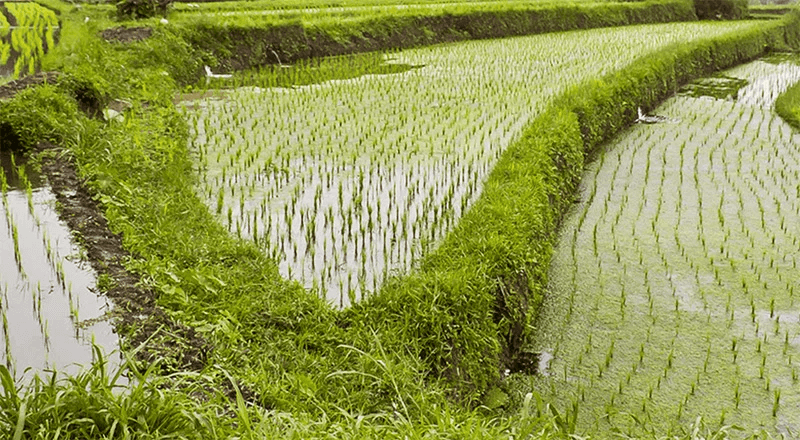Tags
Revolutionizing Sri Lanka’s rice industry through Value Chain Management.

By Lalin I De Silva
This article intends to explore how Value Chain Management (VCM) can optimise cost structures in Sri Lanka’s paddy farming sector; to present innovative rice-based products that can create new markets and improve public health; to analyse global best practices in rice VCM and how Sri Lanka can adapt them and to propose policy measures for utilizing underutilised government warehouses to support rice-based industries.
Rice farming in Sri Lanka has remained stagnant in its methodology for decades. With rising input costs, inefficient farming techniques, and a lack of diversification in rice-based products, farmers struggle to remain profitable while consumers lack access to healthier rice alternatives. The tea industry faces a similar crisis. The government’s role has primarily been reactive, providing subsidies rather than fostering a sustainable model that ensures profitability and nutritional benefits for both growers and consumers.
The adoption of Value Chain Management (VCM) has transformed rice industries in many countries, offering insights into how Sri Lanka can restructure its rice sector. By modernizing supply chains, integrating technology, and promoting value-added rice products, Sri Lanka can transition from a subsidy-dependent rice economy to a self-sustaining and profitable industry.
10 Ways to Reduce Paddy Farming Costs Using Value Chain Management:
Precision Agriculture: Implement satellite and drone-based monitoring to optimise irrigation and fertilizer use, reducing input costs.
Direct Farmer-Market Linkages: Establish digital marketplaces for farmers to sell directly to wholesalers, bypassing middlemen.
Mechanisation & Shared Services: Introduce cooperative-based ownership of harvesting and planting machinery to reduce individual capital costs.
Integrated Pest Management (IPM): Reduce chemical dependency by using biological pest control methods.
Efficient Water Management: Adopt System of Rice Intensification (SRI) methods to cut water usage by 30-50%.

Value Chain Consultant
at www.vivonta.lk
Use of Organic Fertilizers & Biochar: Reduce reliance on expensive chemical fertilizers by producing compost and biochar.
Cluster Farming: Group small-scale farmers into cooperatives for bulk buying of inputs and collective bargaining power.
Post-Harvest Loss Reduction: Invest in proper storage facilities to minimise wastage and maintain grain quality.
Blockchain for Supply Chain Transparency: Implement blockchain technology to track rice production and prevent price manipulation.
Hybrid Rice Varieties: Introduce hybrid rice with higher yields and better disease resistance to increase productivity per acre.
10 Innovative Rice-Based Products for Healthier Consumption:
Rice Flour: Alternative to wheat flour, reducing gluten-related health issues.
Rice Noodles: A popular and easily digestible staple in many Asian diets.
Rice Bran Oil: A heart-friendly cooking oil with high antioxidant properties.
Rice-Based Baby Food: Nutritious and easily digestible food for infants.
Rice Milk: A lactose-free, plant-based milk alternative.
Rice Crackers: A low-calorie, high-fibre snack.
Fermented Rice Beverages: Gut-friendly probiotic drinks.
Rice Protein Powder: A plant-based protein supplement for fitness enthusiasts.
Rice Paper Wraps: Used for making healthier wraps and spring rolls.
Puffed Rice Cereals: A fiber-rich breakfast option.
How 10 Countries Have Successfully Used VCM in Rice Farming:
China: Digital platforms connect farmers directly to consumers, eliminating middlemen and ensuring fair pricing.
India: Government-supported Minimum Support Price (MSP) policy guarantees stable income for farmers while promoting organic farming.
Vietnam: Focus on hybrid rice varieties and export-driven policies making it a global rice hub.
Thailand: Investment in premium rice branding (e.g., Jasmine rice) to fetch higher international market prices.
Japan: Uses contract farming models where food companies directly work with farmers to ensure quality and fair compensation.
Philippines: Rice research institutions work closely with farmers to enhance yield through high-tech solutions.
Bangladesh: Encourages farmer-led cooperatives and shared equipment ownership models.
Indonesia: Government-backed storage and logistics networks reduce post-harvest losses.
USA: Heavy investment in genetically modified (GM) rice varieties and precision farming.
Brazil: Integration of rice farming with aquaculture to maximise land use and increase profitability.
Utilising Government Warehouses for New Rice-Based Industries:
The government owns several underutilized warehouses that can be repurposed for rice processing industries.
Installing modern rice milling and packaging facilities will allow farmers to sell polished rice directly.
Warehouses can serve as hubs for producing rice-based products such as rice flour, noodles, and cereals.
Cold storage facilities can preserve rice bran for oil extraction instead of it going to waste.
Collaborative partnerships with private investors can transform these warehouses into rice innovation centers.
How Both Farmers and Consumers Can Benefit from VCM:
Farmers:
- Higher income through value-added rice products rather than selling raw paddy.
- Reduced dependence on chemical inputs and expensive machinery.
- Improved market access through digital platforms.
Consumers:
- Access to healthier, diverse rice-based products.
- Stable rice prices due to improved supply chain efficiency.
- Nutrient-rich rice alternatives that promote better gut health.
Sri Lanka’s rice industry is at a crossroads. By shifting from a conventional production model to an advanced Value Chain Management approach, both farmers and consumers stand to gain. The government must take proactive steps to modernize farming practices, support rice-based industries, and encourage product diversification. Learning from global best practices, Sri Lanka can transform its rice and the Plantation sectors into profitable and sustainable industries, ensuring food security and economic growth.
https://island.lk/revolutionising-sri-lankas-rice-industry-through-value-chain-management/Published Date: February 13, 2025






